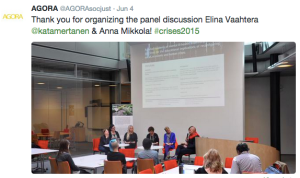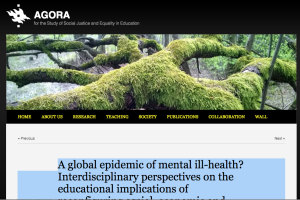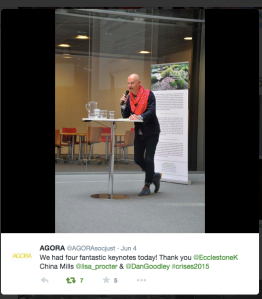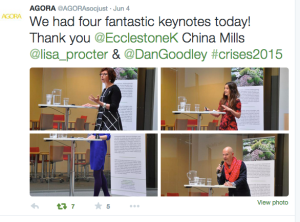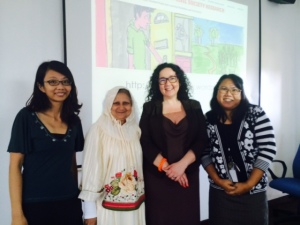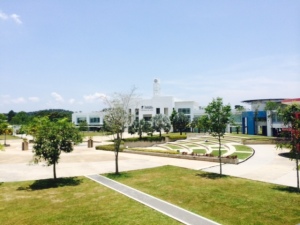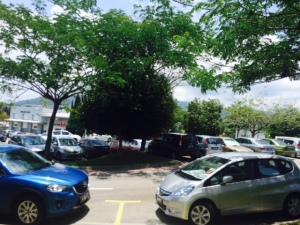Language and JusticeforLB
Max Neill, Dan Goodley, Rebecca Lawthom and Katherine Runswick Cole
On the 10th December 2015 the BBC reported the following:
++++++++++++++++++++++++++++++++++++++++++++++++++++++++++++
NHS trust ‘failed to investigate hundreds of deaths’
By Michael Buchanan, Social Affairs Correspondent, BBC News
10 December 2015
http://www.bbc.co.uk/news/health-35051845
The NHS has failed to investigate the unexpected deaths of more than 1,000 people since 2011, according to a report obtained by BBC News. It blames a “failure of leadership” at Southern Health NHS Foundation Trust. It says the deaths of mental health and learning-disability patients were not properly examined. Southern Health said it “fully accepted” the quality of processes for investigating and reporting a death needed to be better, but had improved. The trust is one of the country’s largest mental health trusts, covering Hampshire, Dorset, Wiltshire, Oxfordshire and Buckinghamshire and providing services to about 45,000 people. The investigation, commissioned by NHS England and carried out by Mazars, a large audit firm, looked at all deaths at the trust between April 2011 and March 2015. During that period, it found 10,306 people had died. Most were expected. However, 1,454 were not. Of those, 272 were treated as critical incidents, of which just 195 – 13% – were treated by the trust as a serious incident requiring investigation (SIRI).
Investigations
The likelihood of an unexpected death being investigated depended hugely on the type of patient.
The most likely group to see an investigation was adults with mental health problems, where 30% were investigated.
For those with learning disability the figure was 1%, and among over-65s with mental health problems it was just 0.3%.
The average age at death of those with a learning disability was 56 – over seven years younger than the national average.
Even when investigations were carried out, they were of a poor quality and often extremely late, the NHS England report says. Repeated criticisms from coroners about the timeliness and usefulness of reports provided for inquests by Southern Health failed to improve performance, while there was often little effort to engage with the families of the deceased.
Key findings from the report
The trust could not demonstrate a comprehensive systematic approach to learning from deaths. Despite the trust having comprehensive data on deaths, it failed to use it effectively.
Too few deaths among those with learning disability and over-65s with mental health problems were investigated, and some cases should have been investigated further.
In nearly two-thirds of investigations, there was no family involvement.
The reasons for the failures, says the report, lie squarely with senior executives and the trust board. There was no “effective” management of deaths or investigations or “effective focus or leadership from the board”, it says. Even when the board did ask relevant questions, the report says, they were constantly reassured by executives that processes were robust and investigations thorough. But the Mazars investigators said: “This is contrary to our findings.” The culture of Southern Health, which has been led by Katrina Percy since it was created in 2011, “results in lost learning, a lack of transparency when care problems occur, as well as lack of assurance to families that a death was not avoidable and has been properly investigated,” the report says. The report was ordered in 2013, after Connor Sparrowhawk, 18, drowned in a bath following an epileptic seizure while a patient in a Southern Health hospital in Oxford. An independent investigation said his death had been preventable, and an inquest jury found neglect by the trust had contributed to his death. Responding to the report’s findings, Connor’s mother, Sara Ryan, said the entire leadership of Southern Health had to go. She said: “There is no reason why in 2015 a report like this should come out. It’s a total scandal. It just sickens me.”
‘Considerable measures’ taken
The report’s authors, who spent months looking into how Southern Health failed to investigate so many deaths, seem to concur. They say: “We have little confidence that the trust has fully recognised the need for it to improve its reporting and investigation of deaths.”In response, Southern Health NHS Foundation Trust said it accepted its processes “had not always been up to the high standards our patients, their families and carers deserve. “However, we have already made substantial improvements in this area over a sustained period of time.”It added: “These issues are not unique to the trust and we welcome the opportunity to shine a spotlight on this important area. “Though the trust continues to challenge the draft report’s interpretation of the evidence, our focus and priority is on continuing to improve the services we provide for our patients.”
It said that when the final report was published by NHS England, it would review the recommendations and make any further changes necessary.
‘Shocking findings’
An NHS England spokesman said: “We commissioned an independent report because it was clear that there are significant concerns. “We are determined that, for the sake of past, present and future patients and their families, all the issues should be forensically examined and any lessons clearly identified and acted upon.”
It added: “The final full independent report will be published as soon as possible, and all the agencies involved stand ready to take appropriate action.”
Norman Lamb, who was the care minister in the coalition government, said the findings were shocking: “You end up with a sense that these lives are regarded somehow as slightly less important than others and there can be no second class citizens in our NHS. “The thought is just horrifying and there have to be some answers from the trust.”
Source: http://www.bbc.co.uk/news/health-35051845
++++++++++++++++++++++++++++++++++++++++++++++++++++++++++++
At the time of writing this blog (Thursday, January 7, 2016) the Governors of this NHS Trust had met to discuss this report and the ‘lack of leadership’ that the report identified in relation to the trust. You can get a bird’s eye view of the meeting here (well at least an edited one):
http://www.itv.com/news/meridian/update/2016-01-05/governors-review-damning-report-over-health-trust/
Last night twitter responded largely with incredulity but also amazement at the lack of perceived accountability of senior management in relation to the dehumanization of people with the label of learning disabilities in the care of the trust. A response of one of the senior managers of the Trust was that their organisation was on a ‘learning journey’, responding to the report and liaising with other services and professionals in order to, one assumes, improve their service. Without getting into the specifics here, nor the names and personnel, we want to consider learning as a phenomenon, process and practice and offer some advice to them or any professional or service truly interested in changing their cultural practices:
- Learning is a tricky idea – learning is a very contested idea especially in the field of educational studies. Learning is not simply about gaining new skills or improving one’s competencies. True learning, according to the late great critical educator Paulo Freire, can be found when one’s perspective on the world is truly transformed by encountering the world. We like this idea of learning. And we put it out there as a model of learning. We hope to see those who work with people with learning disabilities – and anyone showing a passing interest in the Mazar report – to be truly transformed in their thinking. We want them to learn again; to learn that people with the label of learning disabilities are human beings, with rights and lives that we must value.
- Learning is political – Paulo and his comrades developed an approach to learning that they called critical pedagogy. In short this approach saw learning not simply taking place in the classroom (nor senior management meeting room for that matter) but in the wider world. To truly learn then one has to be part of the world and, crucially interested in changing the world. The Mazar report is a huge kick up the arse to anyone interested in improving the lives of people with learning disabilities. It demands not only accountability for past failings but a commitment to new ways of working with people so-labelled as equal stakeholders, full citizens and fellow human beings.
- Learning should eradicate discrimination – no one ever knows everything nor should they ever think that they do. True learners are always modest, uncertain and questioning. But learners should always be engaged with the inequalities endemic within our society. And learners should desire an end to discrimination and oppression for example in the lives of people with the label of learning disabilities. A learning journey should involve visiting people and destinations in order to learn from examples of good practice and communities that value equity. One destination we suggest is self-advocacy; and there are many groups in the UK who can offer wisdom and advice.
- Learning should be uncomfortable – the more we think we know then the more we feel uncertain. We find ourselves outside of our comfort zone; perhaps questioning what we thought we knew in the first place. One response to this is to find an easy answer – or a safe place – that protects us from uncertainty and makes us feel less confused. This is a mistake. Our learning journeys should push us into some difficult spaces and places. And when one finds a location really uncomfortable then perhaps now is the time to move on to another destination for learning.
- Learning is a Human Practice – To get to this new destination, anyone wishing to genuinely learn must answer some very political questions that involve human beings and how we learn together:
“Who am I going to learn from?”
And “How am I going to learn?”.
These human questions are political and social because we have to recognise how the voices of disabled people and their carers have not been heard in current discourse. They certainly don’t seem to be heard anywhere near enough in the immense task of designing healthcare systems that work for the people that use them. This may seem like a task for the technocrats, and those flashy people who are great at producing organisational flowcharts and speaking inspirationally next to flipcharts – those people are no doubt useful, but the serious work of real learning happens elsewhere, other people must be listened to, involved and empowered first.
The answer to “who am I going to learn from?” must be from people who are the real experts in their own lives. This means listening to people with disability and mental health labels, with lived experience of how services succeed and fail, and to the people who love and care for them, their families. It cannot be overemphasised that the key to good services lies with listening to the people who use those services. Every layer of the organisation must be committed to learning, and involve itself seriously in listening precisely to these people, particularly and especially those formally charged with power to make change in the organisation.
The answer to “How am I going to learn?” must be thought about seriously too. Listening to learn from people requires a genuine and quite humble commitment to hear and to act on what is being heard, and services find this very difficult. It’s a process that requires building up longer term trusting relationships because learning is not shared easily or automatically. Somehow a relationship that is often characterised by mutual recrimination and suspicion has to be transformed into one where the people who matter in the process feel genuinely listened to and valued for the contribution they are making. Real listening goes far beyond patronising consultations that some bodies conduct. It to become genuine coproduction, where information is open, hierarchical positions are abandoned, and there is ‘power with’ rather than ‘power over’. A turn of phrase our Paulo would like.
Listening to and involving people must become part of the everyday life of the organisation, a habit so entrenched it seems natural. The dialogue in such coproductive spaces should be in clear everyday language that enables everyone to be included and to contribute. Time and space can be given to people who need to develop what they are trying to say. It’s a task for the whole organisation, not a little special section tasked with listening on behalf of the organisation, when the real decisions are made elsewhere.
This process of learning is the opposite of the dehumanisation revealed by the various reports and inquiries. It requires recognising people as human beings with expertise in their own lives, and on the way services impact on those lives. It requires climbing out of hierarchies and interacting in human ways with a serious commitment to listen and make change. The impact of interacting in such human ways changes the values and language of all the people involved, and we hope creates systems where human beings lives are no longer easily disregarded, because they are people we know, people we care about, people who we recognise as human in a fundamental way.
Our hunch is that perhaps in some organisations the discriminatory assumptions prevalent in society are so deeply entrenched that such fundamental commitment to change from leaders remains a pipe dream. There are two alternatives. One is to decide that such genuine learning is impossible for bureaucratic and market driven service systems and do nothing. We know that if we follow this line nothing will change.
The other is to decide to make a serious attempt at the change, and cultivate all the spaces where it can and does happen. Maybe learning won’t happen in the hopeful way we describe. We do know that when people with many different perspectives are drawn together, and they genuinely listen and learn to each other, the outcomes can be surprising.
So, we are all for a learning journey, but where do we want to go?

